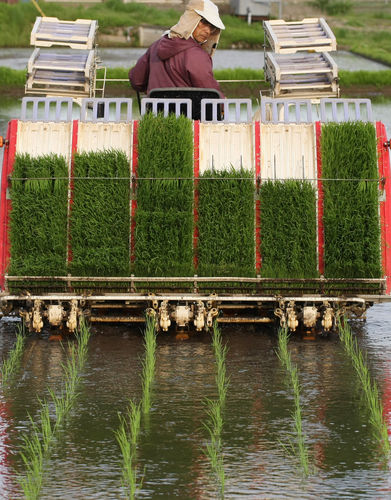Japan may open beef in TPP trade talks, former adviser says

Bloomberg | Mar 15, 2013
Japan may open beef in TPP trade talks, former adviser says
Prime Minister Shinzo Abe may sacrifice barriers protecting Japan’s beef and wheat farmers as he joins the Trans-Pacific Partnership trade talks, said a former government adviser on farm policy.
By Aya Takada & Yasumasa Song
Aug. 3 (Bloomberg) — Wheat and rice paddies have become the battleground for a dispute between Japan’s agricultural and business lobbies. The so-called Trans-Pacific Partnership started in 2005 as a pact to open the trade of goods, services and government procurement among members. Some of Japan’s farmers and an agricultural cooperative say the nation’s joining the agreement will kill the domestic farming industry. Business proponents say the TPP is needed to maintain competitiveness. Bloomberg’s Yuriy Humber reports.
“Japan may be able to protect about 5 percent of its total goods in the TPP talks,” Shogenji said in an interview on March 12. “Rice is the national staple, sugar is vital to Okinawa prefecture and milk is what our kids drink.”
Eliminating the 38.5 percent tariff on beef would probably spur a jump of as much as 40 percent in imports and help exporters including the U.S. and Australia displace half of local produce, according to Tetsuro Shimizu, a general manager at Norinchukin Research Institute in Tokyo. Cutting the 252 percent tariff on wheat and ending the agriculture ministry’s control of purchases may bring 600,000 metric tons a year in shipments, said Masaaki Kadota, executive director at Japan Flour Millers Association.
“While we must maintain domestic production of rice and milk to ensure food security, beef may be an easier sector to concede,” Shogenji said. “Tariffs on beef are not so high compared with other items, and our wagyu beef is a high-quality product that can compete with imports.”
Beef Costs
Removal of import duties would lower beef-purchasing costs for Japanese buyers such as Nippon Meat Packers Inc. (2282), boosting their earnings, said Takaki Shigemoto, an analyst at research company JSC Corp. in Tokyo.
The share price of the Osaka-based company surged as much as 9.8 percent today to the highest level since October, 2008. Prima Meat Packers Ltd. (2281) rose as much 5.5 percent and Itoham Foods Inc. (2284) jumped as much as 4.8 percent.
South Korea agreed to phase out beef tariffs over 15 years when it reached a free-trade deal with the U.S., which took effect in March, 2012.
Japan imposes tariffs of 778 percent on rice imports, 328 percent on sugar and 218 percent on powdered milk.
The bid to join the TPP talks drew criticism in the U.S. even before it was announced, with Representative Sander Levin of Michigan joined by 46 other Democrats in a letter to President Barack Obama that said the automobile import market in Japan was unfairly closed.
‘Bridge to Cross’
Brett Stuart, chief executive officer of Global AgriTrends, a Denver-based meat research company, said there was “still a big bridge to cross regarding sensitive agricultural commodities.”
The U.S. Trade Representative’s office last year listed Japan’s restrictions on beef and rice imports in the agency’s annual report on foreign-trade barriers.
Keidanren, the nation’s biggest business lobby with members including Toyota Motor Corp. and Nippon Steel & Sumitomo Metal Corp., urged the government to join the partnership to increase the competitiveness of exporters. JA Group, the largest farmers’ organization, is against the pact and members of Abe’s own ruling Liberal Democratic Party have called for special treatment for agricultural produce including beef and wheat.
GDP Impact
While agriculture, forestry and fisheries make up less than 2 percent of Japan’s economic output, JA Group’s 10 million members make up 8 percent of the population, partly thanks to a large number of part-time farmers.
In previous free-trade negotiations with countries including Thailand, India and Chile, Japan was able to exclude rice, wheat, sugar, beef and dairy products.
“The TPP talks aim for a high level of liberalization and it will be difficult for Japan to protect them all,” Satoshi Fujiwara, vice president at the equity research department of Nomura Securities Co., said on March 13 “The nation may have to give up products excluding rice and sugar.”
Japan already depends on imports for 60 percent of its food and joining the TPP could help exporters from Nissan Motor Co. to Sony Corp. compete with rivals from South Korea to the U.S.
Global Share
An agreement would be the biggest free-trade deal for the U.S., and the first new accord under Obama. The region represents more than half of global output and more than 40 percent of world trade, according to the U.S. trade office.
The TPP started in 2005 with Brunei, Chile, Singapore and New Zealand as a pact to open trade in goods, services and government procurement. Negotiations have extended to Australia, Canada, Malaysia, Mexico, Peru, Vietnam and the U.S., which aims to complete the TPP talks by the end of 2013.
Japan is Asia’s biggest beef importer and bought 515,108 tons of the meat worth 221 billion yen ($2.3 billion) in 2012, data from the agriculture ministry show. Australia accounted for 62 percent of shipments, followed by the U.S. with 26 percent and New Zealand at 6.1 percent.
The nation is the second-largest wheat buyer, with domestic producers meeting only about 10 percent of requirements, compared with almost 100 percent for rice and milk, and 40 percent for sugar, Shogenji said.
Japan imported 5.57 million tons of food wheat last fiscal year, according to the agriculture ministry. The U.S. was the largest supplier, accounting for 58 percent, followed by Canada with 23 percent and Australia at 18 percent.





